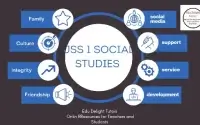Revision of All Topics Covered Islamic Religious Studies JSS 1 First Term Lesson Notes Week 11
Islamic Religious Studies JSS 1 First Term Lesson Notes Week 11
Subject: Islamic Religious Studies
Class: JSS 1
Term: First Term
Week: 11
Age: 11 – 12 years
Topic: Revision of All Topics Covered
Overview
This week, we will review all topics covered in the first term. We will have different parts to help students remember and understand key concepts.
Part A: Review and Revision (20 FAQs with Answers)
- What is At-Tahārah?
At-Tahārah means purification. It is important for worship in Islam. - Why is Wudu necessary?
Wudu is necessary before performing Salah (prayer). It helps us to be clean. - What are the two types of Najasah?
The two types are major Najasah (like blood) and minor Najasah (like dirt). - What is the first pillar of Islam?
The first pillar is Iman, which means faith. - What are the six articles of Iman?
They include belief in Allah, angels, books, prophets, the Day of Judgment, and Qadar (divine decree). - What does Kalimatush-Shahādah mean?
It means the declaration of faith, stating that there is no god but Allah and Muhammad is His messenger. - How can Sūratun-Nās help Muslims?
It helps Muslims seek protection from evil and harm. - What is the significance of Sūratul-Falaq?
It is a prayer for protection from bad things and negative influences. - Why is charity (Zakat) important in Islam?
Zakat helps to purify wealth and support those in need. - What is the meaning of fasting in Ramadan?
Fasting means not eating or drinking from dawn to sunset. It teaches self-control and empathy. - How does one perform Wudu?
Wudu involves washing the hands, mouth, nostrils, face, arms, head, and feet in a specific order. - Why is Iman considered the foundation of Islam?
Iman is the belief in Allah and the core of all Islamic practices. - What is the role of the Prophet Muhammad?
He is the final prophet who brought the message of Islam to humanity. - How does understanding the Qur’an strengthen a Muslim’s faith?
The Qur’an guides Muslims in their daily lives and teaches them about Allah and His commands. - What should Muslims do if they become Najasah?
They must perform At-Tahārah (purification) before praying. - What lessons can be learned from Sūratul-Falaq?
It teaches us to seek refuge in Allah from all forms of harm. - What does it mean to declare Iman?
It means to sincerely believe in the core principles of Islam. - Why should Muslims memorize certain Surahs?
Memorizing Surahs helps in prayer and strengthens their connection to Allah. - What is the purpose of performing prayer (Salah)?
Salah connects Muslims to Allah and is a way to show devotion. - How can one seek Allah’s protection?
By reciting specific Surahs and making dua (supplications).
Part B: Objective Questions (20 Fill-in-the-Blank Questions)
- The first pillar of Islam is __________.
a) Zakat
b) Salah
c) Iman
d) Hajj - At-Tahārah means __________.
a) Charity
b) Purification
c) Fasting
d) Prayer - The Arabic term for faith is __________.
a) Iman
b) Zakat
c) Wudu
d) Hajj - The last prophet in Islam is __________.
a) Jesus
b) Moses
c) Muhammad
d) Ibrahim - Sūratul-Falaq is recited for seeking __________.
a) Guidance
b) Wealth
c) Protection
d) Health - Najasah refers to __________.
a) Cleanliness
b) Impurity
c) Prayer
d) Fasting - The two types of Najasah are major and __________.
a) Minor
b) Clean
c) Ritual
d) Spiritual - Wudu is required before __________.
a) Eating
b) Sleeping
c) Prayer
d) Walking - Zakat is a form of __________.
a) Charity
b) Fasting
c) Prayer
d) Worship - Fasting during Ramadan helps develop __________.
a) Wealth
b) Knowledge
c) Self-control
d) Power - The declaration of faith is called __________.
a) Salah
b) Hajj
c) Kalimatush-Shahādah
d) Zakat - The Qur’an was revealed to the Prophet __________.
a) Musa
b) Isa
c) Muhammad
d) Ibrahim - Muslims perform Wudu to ensure __________ before prayer.
a) Cleanliness
b) Wealth
c) Knowledge
d) Happiness - Iman has __________ articles of faith.
a) Five
b) Six
c) Seven
d) Eight - Sūratun-Nās is the __________ chapter of the Qur’an.
a) 112
b) 113
c) 114
d) 115 - The purpose of Zakat is to help the __________.
a) Rich
b) Poor
c) Healthy
d) Young - The prayer in Islam is called __________.
a) Zakat
b) Iman
c) Salah
d) Wudu - To seek Allah’s protection, Muslims recite __________.
a) Dua
b) Surahs
c) Hadith
d) All of the above - The month of fasting in Islam is called __________.
a) Shawwal
b) Muharram
c) Ramadan
d) Safar - The last chapter of the Qur’an is __________.
a) Sūratun-Nās
b) Sūratul-Falaq
c) Al-Fatiha
d) Al-Ikhlas
Part C: Theory Questions (20 Simple Short Answer Questions)
- Define At-Tahārah.
- Why is Wudu important in Islam?
- What are the two main types of Najasah?
- Explain the significance of Iman.
- Describe the process of performing Wudu.
- What are the six articles of Iman?
- What is the purpose of Kalimatush-Shahādah?
- How does Sūratun-Nās help Muslims?
- Discuss the meaning of Sūratul-Falaq.
- What role does Zakat play in Islam?
- What is the meaning of fasting during Ramadan?
- How does prayer (Salah) connect Muslims to Allah?
- What lessons can be learned from the Qur’an?
- Describe the importance of the Prophet Muhammad.
- How can Muslims overcome Najasah?
- Why is it important to memorize Surahs?
- What does it mean to declare one’s faith?
- How does understanding the Qur’an enhance a Muslim’s life?
- Why is it necessary to be pure before prayer?
- What is the significance of charity in Islam?
Part D: True or False Questions (20 True or False Questions)
- Iman is the second pillar of Islam.
- Wudu is required before prayer.
- At-Tahārah is related to cleanliness.
- Sūratul-Falaq is used for seeking wealth.
- Zakat is optional in Islam.
- The Qur’an was revealed to the Prophet Musa.
- There are five articles of Iman.
- Sūratun-Nās is recited for protection.
- Fasting is observed in the month of Ramadan.
- The last prophet is known as Muhammad.
- Najasah means purity in Arabic.
- Kalimatush-Shahādah is a declaration of faith.
- Sūratul-Falaq has five verses.
- The act of prayer is known as Salah.
- Charity is an important part of Islam.
- Muslims must perform Wudu before Salah.
- Iman has no connection to the other pillars.
- The Prophet Muhammad is the last prophet.
- Sūratul-Falaq warns against bad influences.
- Purification is not important for prayer.
Part E: Fill in the Gaps Questions (20 Fill-in-the-Blank Questions without Options)
- The first pillar of Islam is __________.
- Wudu is a type of __________.
- The Arabic term for faith is __________.
- The last prophet of Islam is __________.
- Charity in Islam is known as __________.
- Fasting during Ramadan teaches __________.
- The Qur’an is a __________ for Muslims.
- Sūratun-Nās is recited for __________.
- Najasah refers to __________.
- The month of Ramadan is the month of __________.
- Kalimatush-Shahādah declares that __________ is the only god.
- Iman consists of __________ articles of faith.
- Zakat is given to help the __________.
- The act of prayer is called __________.
- Understanding the Qur’an is essential for __________.
- Sūratul-Falaq helps in seeking __________.
- Wudu must be performed before __________.
- Muslims should memorize important __________.
- The Qur’an was revealed to the Prophet __________.
- The last chapter of the Qur’an is __________.
Conclusion
This week’s lesson will help students consolidate their understanding of key concepts from the first term. Through these activities, they will be prepared for future lessons and deepen their connection to Islamic teachings.


